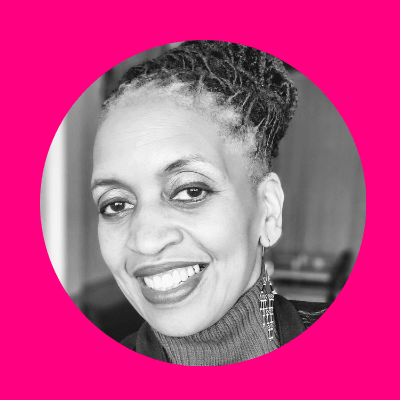On Tuesday, November 16, 2021, Monmouth University’s School of Social Work “Growing Together as Allies” (GTAA) lecture series hosted Dr. Denise-McLane Davison who delivered a presentation titled, “The Strengths of Black Families”. The event, with an audience of 98, was co-sponsored by the Institute for Global Understanding and was partially funded through a Diversity and Innovation Grant from the Intercultural Center. GTAA is a committee of faculty, students, and alumni from the School of Social Work working to advance anti-racism within the school, university, and community.
Dr. Denise-McLane Davison is an associate professor of social work at Morgan State University and the founding researcher and archivist of the National Association of Black Social Workers, Inc. (NABSW) National Repository at Morgan State University and the recipient of The HistoryMakers, Inc. 2020 National Digital Humanities Award, as well as the 2020 Faculty Women of Color in The Academy Zenobia L. Hikes Teaching-Research National Award Winner. The session addressed the strengths of Black families as amplified by Black social workers and scholars historically and currently.
Dr. McLane-Davison began by inviting the audience to honor their family journeys and to start by getting grounded and connected in the Zoom space she created. She framed her presentation in womanist pedagogy that is organic, practice-informed, and transdisciplinary — produced through the rituals, traditions, values, culture and resilience of historically disenfranchised communities.
In her presentation, Dr. McLane-Davison shared that the strengths of Black families are interwoven into institutions such as NABSW and social work programs at Historically Black Colleges and Universities. Founded in 1968, NABSW regards the preservation of the Black family and community as its primary responsibility due to research and discourse that pathologized Black families. The strengths perspective has guided their members’ scholarship, practice, and curriculum for over 50 years. Black families have a strong work orientation, strong religious orientation, strong belief in family, strong achievement orientation, and adaptable family roles, among other strengths. This scholarship is largely silenced in social work education resulting in social workers that view Black families from a pathological lens that assumes families are incapable of addressing their own challenges.
Throughout the dynamic and interactive presentation, Dr. McLane-Davison presented the history of Black social work organizations’ naming the central problems of structural violence and racism that continues today. As early as 1926, the First Public Welfare Institute for Negro Social Workers voiced its concerns about challenges that Black families and communities were facing—housing discrimination, police brutality, equal rights, jobs, and surveillance laws that enabled police and government to control access of people and communities. In 1968, the National Federation of Student Social Workers charged the national social work organization with “welfare colonialism” for failure to address structural poverty.
Dr. McLane-Davison concluded by asking the audience to reflect on the fact that we, as social workers and society, have known about racial injustice and structural poverty and asked why we haven’t done anything. She asked, “Where do we go from here? What must we learn? What must we unlearn? Do we believe we have the power to change?”. These questions led to an hour-long discussion with attendees who were inspired and energized by the presentation.
To learn more about the final session hosted by the School of Social Work’s “Growing Together as Allies” Fall Lecture series, please click here.

